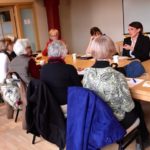Action Committee work
Throughout the year, the Action Chair and various members of the committee follow issues that impact the livability of the Portland area. They do this by attending meetings of governmental agencies, boards, and commissions. They also work with nonprofit partner organizations and read reports from academic and reliable media sources. We follow many of the issues on which we have advocacy positions. Members of the Action Committee may propose advocacy on the topics they follow.
Recently, Action Committee members have been focusing on justice, public safety, local government, affordable housing, fair representation, transparency, and environmental issues (including climate change, clean water, and air quality).
In addition, during the year, the Action Committee presents meetings on subjects of concern to our members. The committee generally meets on the fourth Friday from 1:30 pm – 3:30 pm by Zoom. Meeting announcements are in the Voter newsletter.
Action Committee meetings
All League members are welcome to attend Action Committee meetings. Contact Action Chair Debbie Aiona with questions: action@lwvpdx.org
Fall 2023 – Spring 2024 Action Committee meetings
April 2024: Action Committee members learned about the Urban Flood Safety and Water Quality District (UFSWQD) from Executive Director Jim Middaugh and Planning and Public Affairs Director Colin Rowan at the April Action Committee meeting. The agency is responsible for protecting the area along the Columbia River from damaging floods. Hurricanes Katrina and Sandy in 2005 and 2012, respectively, triggered national actions affecting our region. Finally, the federal government elevated flood protection standards. Our system does not meet the new standards. Funding for infrastructure improvements has been the challenge that resulted in placing a bond measure (Measure 26-243) on the May 2024 ballot. (The measure was approved by voters. It will generate $150 million that will be used to bring the infrastructure up to federal standards by raising and repairing levees and floodwalls and upgrading seven pump stations.)
March 2024: Members of the League’s Education Interest Group, Tom Dyke, Christine Andersen, and Paulina Leperi, presented the results of the data collection and analysis they conducted for the purpose of understanding Portland Public Schools’ (PPS) efforts to improve student achievement using a funding approach rooted in equity. Oregon standardized test scores reveal that Portland compares well to a sampling of other districts in the state in English/language arts, math, and science, and outperforms other similarly sized districts like Beaverton, Hillsboro, and Salem-Keizer. Furthermore, Oregon students’ performance is near the U.S. average on the National Assessment of Educational Progress.
February 2024: In February, guest speakers Susan Mottet, Small Donor Elections Director, and Amy Sample Ward, Portland Elections Commission Chair, briefed the Action Committee on the history of Portland’s Small Donor Elections (SDE) program and how it works. Portland adopted a matching system – candidates seek donations and the city provides matching funds. Charter reform created a unique situation for the SDE program in 2024. In the past, half of the city offices were open each election year. This year all the positions are open and, with a larger City Council, there are 12 seats to fill. This has created a need for more funding than in the past
January 2024: Sarah Huggins, a Portland Parks and Recreation Sustainable Future project manager, with an assist from Todd Lofgren, the PP&R deputy director, briefed Action Committee members on our parks system, funding, and options for the future. Portland’s park system manages 11,712 acres of land, 146 neighborhood parks, 8,000 acres of natural areas, 1.4 million trees, pools, playgrounds, community centers, golf courses, and more. It places a high priority on being responsive to diverse and changing community needs. Over the last 100+ years, PP&R has relied primarily on voter-passed bond measures and property tax levies to pay for facilities and provide services. This financing structure has resulted in a significant shortfall in resources needed to maintain existing facilities.
November 2023: Action Committee members learned the basics of tax increment financing (TIF), or urban renewal, at their November meeting. Guests included representatives from Prosper Portland — Lisa Abuaf, Director of Development and Investment, Brian Moore, Manager of Development and Investment, Tony Barnes, Chief Financial Officer, and Program Managers Roger Gonzalez and Kathryn Hartinger. Antoinette Pietka from the Portland Housing Bureau also joined us. The team started off with the basics of TIF, which is one source of funding available to the city for “sticks and bricks” projects. TIF resources can fund infrastructure such as parks and roads, provide loans and grants to rehabilitate buildings, acquire and dispose of property, and engage in commercial tenanting.
October 2023: October Action Committee speaker, Paul Leistner, Ph.D., senior fellow, Center for Public Service at the PSU Hatfield School of Government, has vast experience with community engagement as a volunteer, a former employee in Portland’s Office of Neighborhood Involvement/Civic Life, and an academic. He started off by emphasizing the rights of people to have a voice in the decisions that affect them. He then reviewed the history of Neighborhood Associations in Portland. He is optimistic that with a city administrator experienced in implementing meaningful community involvement systems, Portland’s program has the potential to encourage participation of the community in its full diversity so everyone can have a role in influencing the decisions that affect them.
September 2023: Kaia Sand, Street Roots executive director, spoke to the Action Committee about Portland Street Response (PSR). She began her presentation by reminding everyone about research showing that about half the people Portland police arrest are homeless, and their arrests are less likely to be for violent crimes than among the general population. In 2019, Street Roots proposed an alternate approach to handling calls about unhoused people. It would send a team made up of a medic and crisis worker to deescalate the situation and offer support. This idea went on to become Portland Street Response.
Fall 2022 – Spring 2023 Action Committee meetings
April 2023: Bureau of Development Services (BDS) Building Official Matt Rozzell and Public Information Officer Ken Ray filled us in on the basics of building codes and permits. In 1973, Oregon became one of the first states to enact a statewide building code. The code requires contractors and individuals to obtain permits when undertaking new construction, remodels, or other improvements. Permits and inspections protect business owners, occupants, and the investment in the building and ensure work is done safely. The city is currently engaged in a Permit Improvement Project with representatives from the Bureaus of Transportation, Environmental Services, Water, Housing, Parks, and Fire serving on the task force. There is also a stakeholder group from the state, county, and city working on improving the regulatory processes applicable to childcare facilities. The Bureau of Development Services is developing a website with information specific to childcare providers that will help them navigate the permit process.
February 2023: Multnomah County Library Bond Measure Progress Report: Building Libraries Together. Our Action Committee guest was Katie O’Dell, library capitol bond deputy director. She explained that there are 19 locations open to community members, that we are one of the busiest systems in the country, and our public library dates back to 1864. In November 2020, voters approved a $387 million capitol bond measure to implement the improvement plans. It calls for a new library in East County equivalent in size to the Central Library. There will be significant renovations and expansions at the Albina, Belmont, Holgate, Midland, North Portland, Northwest, and St. Johns libraries. The remaining branches will receive updates and upgrades such as paint, carpeting, and redesigned space. There also will be a new central operations and materials-handling center located at 122nd and NE Glisan on the site of a former Safeway. Internet speed will be improved at all locations.
January 2023: Portland League members met with the new Portland City Auditor, Simone Rede, to learn about her plans and priorities. Auditor Rede reported that there is no shortage of challenges as she begins her term in office. The selection of issues for performance audits is based on the risks involved. For example, the office currently is auditing the Joint Office of Homeless Services and shelter system. The office maintains a schedule of upcoming audits so that the public will know what is on the horizon. They also accept suggestions for city functions that merit a closer look. Issues of immediate concern can be submitted to the city’s Fraud Hotline.
January 2023: The League hosted a meeting to organize a new Charter Implementation Committee. Twenty-eight LWVPDX members signed up to help on various subcommittees to follow the Portland City Committees:
-
- Government Transition Advisory Committee (GTAC)
- Independent District Commission (IDC)
- Independent Salary Commission (ISC)
- Ranked Choice Voting (RCV)
- Budget
October 2022: The Topic was the Metro Supportive Housing Services Program: Making a Difference in Portland, with Laura Golino de Lovato, Northwest Pilot Project Executive Director
September 2022: The topic was “Charter Extravaganza” (proposed amendments to the Portland City and Multnomah County Charters) with Sol Mora, Portland United for Change campaign manager on Portland Charter Reform – Measure 26-228, plus Kali Odell, Multnomah County Charter Review Committee program manager, and Annie Kallen, member, Multnomah County Charter Committee, speaking on Multnomah County Charter Amendments – Measures 26-230 through 26-236.
Fall 2021 – Spring 2022 Action Committee meetings
April 2022: The topic was Multnomah County Preschool for All, with Leslee Barnes, Preschool for All Director
March 2022: The topic was Mental Health and Homelessness, with Drew Grabham, LCSW, Portland Street Medicine and Jason Renaud, Mental Health Alliance, LWV member
February 2022: The topic was Portland Police Bureau Focused Intervention Team and Community Oversight Group with Sam Adams, Director of strategic innovations, Office of the Mayor, Focused Intervention Team leader, Captain James Crooker and Lieutenant Ken Duilio, and Community Oversight Group chair, Pastor Ed Williams
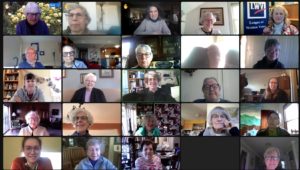
In January 2022, the Action Committee heard from two LWV members, Barbara Klein and Janice Thompson. Janice and Barbara have studied election systems. They discussed various election methods and systems that could support the goals of the Portland City Charter Review Commission. The Commission is considering changes to the way Portland voters elect the members of the City Council. They want the City Council to better represent and respond to all the people they serve. In addition, the Commission wants to improve Portland voters’ ability to have their voices heard and their votes count.
In November 2021, the Action Committee heard fr0m Diane Brandsma about “Teenage Girls at Risk: Gender-Specific Programming for System-Involved Young Women.” Ms. Brandsma has more than 30 years of experience working with system-affected youth and families whose lives have been deeply affected by trauma.
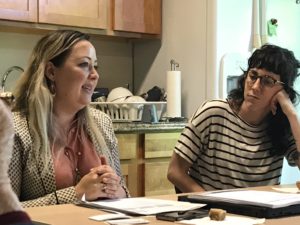
In October 2021, the Action Committee guest, Nui Bezaire, provided an overview of the initial steps Metro and its three counties have taken to implement the supportive housing services measure voters passed in May 2020. (Ms. Bezaire had spoken about supportive housing at the Action Committee’s April 2019 meeting.) Supportive housing includes permanent housing along with wraparound services. The services can include but are not limited to healthcare, addiction and recovery, employment, education, and rent subsidy. They are flexible and tailored to the specific needs of individuals and families.
In September 2021, the Action Committee presented a meeting on transparency in government. Emily Harris, representing Open Oregon, and Margie Sollinger, City of Portland Ombudsman, were the September Action Committee guests. They addressed transparency and public records and how they relate to the Portland Charter Review Commission.
Fall 2020-Spring 2021 Action Committee meetings via Zoom
In April 2021, the Action Committee focused on our regional public transportation agency, TriMet. The topic was current challenges and future plans. The speakers were JC Vannatta, TriMet Public Affairs Executive Director and Tom Markgraf, TriMet Public Affairs Director.
In March 2021, the Action Committee heard from speakers from the Environmental Protection Agency (EPA):
-
- Caleb Shaffer, EPA Region 10 Portland Harbor Team Lead
- Richard Francis, EPA Region 10 Portland Harbor Remedial Project Manager
- Laura Knudsen, EPA Region 10 Community Involvement Coordinator
They spoke about progress with the Portland Harbor Superfund Cleanup. The project recently reached a turning point when EPA announced that the contaminated sites throughout the 10-mile-long project area are now in the remedial design stage. During this part of the process, new sediment and water samples will be taken to guide the final remedial design.
In February 2021, Daniel Lewkow, deputy director of Portland’s Open and Accountable Elections, explained how the program works. Portland’s Open and Accountable Elections program, a publicly funded campaign finance matching system, was enacted in 2016 by city council and is available to candidates running for city office. It is modeled on similar programs operating throughout the country. In order to participate, candidates must meet specific requirements, such as raising qualifying contributions, limiting the size of contributions they accept, and participating in a training program. Data from the 2020 Portland elections show donors from a wider range of income, ethnicity, and location are able to participate in the process of political campaigns through their contributions. The program reduces reliance on big money and brings in new voices.
In January 2021, Assistant U.S. Attorney Jared Hager spoke to the Action Committee about the history of the U.S. Department of Justice Settlement Agreement with the City of Portland. In 2014, the city and DOJ finalized a 180-paragraph Settlement Agreement requiring the city to make a number of improvements to PPB and other related functions, including the city’s police oversight system. The agreement primarily covers use of force, training, crisis intervention, employee information systems, officer accountability, and community engagement. The DOJ and a Compliance Officer/Community Liaison (COCL) provide regular progress assessments and report annually to U.S. District Judge Michael Simon.
In November 2020, the Action Committee heard about wildfire management from Dr. John Bailey, a Professor of Silviculture and Fire Management in the College of Forestry at Oregon State University. Dr. Bailey previously worked with the Environmental Protection Agency in Corvallis and at Northern Arizona University. His expertise includes forest stressors, ponderosa pine silviculture, fuels/fire management, ecological restoration, sustainable forestry in drier fire-prone forest types, and multi-story management in mixed forest types. He showed how wildfire suppression, combined with climate change, has created conditions for wildfires that are hotter, more difficult to manage and spread more quickly. He also discussed ways to reduce the threat of wildfires in the future.
In October 2020, Steve Kountz, senior economic planner for the Portland’s Bureau of Planning and Sustainability, continued the discussion of Portland’s Economic Opportunities Analysis (OEA). He explained to the Action Committee that Portland’s challenge is identifying land sufficient for industrial uses, particularly marine industrial. This has been made more difficult because of the upzoning of industrial lands into residential uses, such as at the South Waterfront and Terminal 1, or commercial uses like Cascade Station mall and the possible siting of a baseball stadium at Port of Portland’s Terminal 2. The upcoming OEA process will include careful analysis of employment types, wages, racial income disparities, neighborhood affordability and occupational segregation, among other factors. At key points during the analysis phase, the Bureau of Planning and Sustainability will host workshops at which staff will share the information and participants can provide feedback.
In September 2020, Bob Salinger, the Audubon Society Conservation Director, spoke to Action Committee members about Portland’s upcoming Economic Opportunities Analysis (OEA). Background for this discussion is that in 1973, Gov. Tom McCall signed into law Senate Bill 100, Oregon’s statewide land use planning program. It established 19 goals that have guided the planning efforts of local jurisdictions over the last 45+ years. Goals 9 and 10 require adequate buildable land inventories to meet 20-year jobs and housing forecasts. Salinger pointed out that open space and natural areas are quite often where the city looks for industrial land expansion.
Winter/Spring 2020 Action Committee meetings
The Action Committee meeting scheduled for March 27, 2020 was cancelled due to the COVID-19 health crisis.
In February 2020, the Action Committee heard a presentation on Seismic Resiliency and Portland’s Critical Energy Infrastructure Hub, with speakers Trent Nagele, Oregon Seismic Safety Policy Advisory Committee member, and Mike Myers, director, Portland Bureau of Emergency Management. The Critical Energy Infrastructure (CEI) Hub is located in NW Portland along the Willamette River. The Hub is home to tanks that contain more than 90% of Oregon’s liquid fuel supply and 100% of the jet fuel for the Portland airport. The vast majority of the fuel tanks were built before modern codes were adopted and sit on soils subject to liquefaction. Scientists estimate there is a 20-40% chance of a major offshore Cascadia Subduction Zone earthquake occurring in the next 50 years. Spillage of the fuels would result in environmental devastation that could extend as far away as the Pacific Ocean.
Sara Wolk, executive director of the Equal Vote Coalition (www.equal.vote), spoke at the January 2020 Action Committee meeting. The coalition is an Oregon-based group working to promote a new approach to voting that is fair, accurate, and nationally viable. They have identified the STAR (Score Then Automatic Runoff) voting system as their preferred option. The STAR system is a hybrid of Ranked Choice and Score Voting. The STAR ballot asks voters to score each candidate on the ballot on a scale of 0 – 5 stars. The two highest scoring candidates are the finalists and the finalist preferred by the majority of voters wins the race.
Fall 2019 Action Committee meetings
In November 2019, the Action Committee heard from Alejandro Queral, executive director of the Oregon Center for Public Policy. Queral spoke to the committee about the center’s contribution to well-researched information related to issues facing Oregonians. The research is used to make the case to the Legislature for policies affecting working families and those living in poverty. Queral highlighted a recently released fact sheet on income inequality. You can find a wealth of research and analysis on the organization’s website, including information about other issues such as the state budget, education, healthcare, housing, and taxes.
The October Action Committee Meeting was about Civic Engagement in Portland and the 3.96 Code Change Project. Winta Yohannes, policy adviser to City Commissioner Chloe Eudaly, shared information about the efforts and rationale for revising City Code Section 3.96, which currently describes the structure and functions of the city’s Neighborhood Association system. She explained that the Office of Neighborhood Involvement was renamed a few years ago and is now known as the Office of Community and Civic Life.. More information on the project is available at the Office of Community and Civic Life website.
The September Action Committee meeting featured two presentations: one by Friends of the Library representative Kirsten Leonard, who spoke about the services and critical space needs of the Multnomah County Library System, and another by PSU Professor Mary C. King, who is advocating for free universal preschool. A report on their presentations is in our October 2019 eVoter newsletter.
Winter & Spring 2019 Action Committee meetings
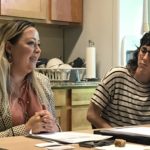 The April Action Committee Meeting was on Friday, April 26, 2019, with Nui Bezaire, Multnomah County Joint Office of Homeless Services, and Melissa Arnold, Home Forward, Community Services program supervisor, speaking on Permanent Supportive Housing.
The April Action Committee Meeting was on Friday, April 26, 2019, with Nui Bezaire, Multnomah County Joint Office of Homeless Services, and Melissa Arnold, Home Forward, Community Services program supervisor, speaking on Permanent Supportive Housing.
The March Action Committee meeting was on Friday, March 22, 1:30-3:30. The subject was “Compassionate Change District – Central Eastside Industrial District.” Sandra Comstock, Right 2 Survive and Compassionate Change District representative, was the speaker.
The February Action Committee meeting was on the City of Portland’s Role in the Portland Harbor Superfund Site. The speakers were Cindy Ryals, technical program manager for Portland Harbor Superfund, and Jessica Terlikowski, senior community outreach and information representative for Portland Harbor Superfund. They both work for the Portland Bureau of Environmental Services. The slide presentation that they prepared for this meeting may be viewed by clicking here.
The January Action Committee meeting was on Proposals for Tax Reform in Oregon, with John Tapogna, ECONorthwest, president/partner

Fall 2018 Action Committee meetings
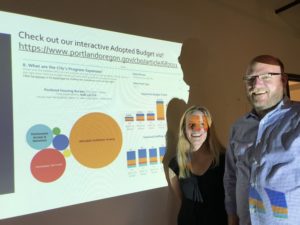 The September Action Committee meeting featured a presentation by staff members from the Portland City Budget Office. Shannon Fairchild, Senior Financial Analyst, and Josh Harwood, Chief Economist, explained the budget process and answered the committee’s questions. A full report about this meeting was in the November issue of the Voter newsletter.
The September Action Committee meeting featured a presentation by staff members from the Portland City Budget Office. Shannon Fairchild, Senior Financial Analyst, and Josh Harwood, Chief Economist, explained the budget process and answered the committee’s questions. A full report about this meeting was in the November issue of the Voter newsletter.
The subject of the October Action Committee meeting was Oregon’s Air Quality. Mary Peveto, president of Neighbors for Clean Air, spoke to committee members. An article about this meeting was in the December issue of the Voter newsletter.
The November 2018 Action Committee meeting was on juvenile justice. A report will be in the January newsletter. For more information about the Action Committee, contact Debbie Aiona at action@lwvpdx.org.
Winter and Spring 2018 Action Committee meetings
The January Action Committee meeting was a presentation and discussion about Prosper Portland, formerly the Portland Development Commission – Portland’s Economic Development agency. A report on this meeting was in our March newsletter.
The February Action Committee meeting featured a discussion about Metro’s Equitable Housing Initiative, with Metro Councilor Sam Chase. For more background information on the topic, refer to the fact sheet here. There was a report on this meeting in our April newsletter.
The March Action Committee meeting was a discussion about Criminal Justice Reform with Kate Gonsalves, political director, Oregon Justice Resource Center. There was a report in our May newsletter.
The April Action Committee meeting featured a discussion about Protecting and Improving Portland’s Water Quality and Environment, with speakers from Portland’s Bureau of Environmental Services:
- Sallie Edmunds, Central City, River and Environmental Planning Manager
- Jeff Caudill, South Reach Project Manager
- Mindy Brooks Environmental-zone Map Correction Project Manager

